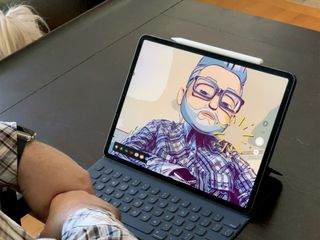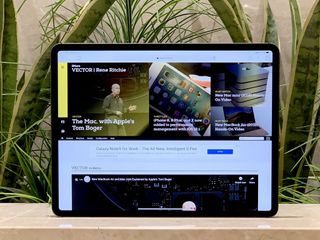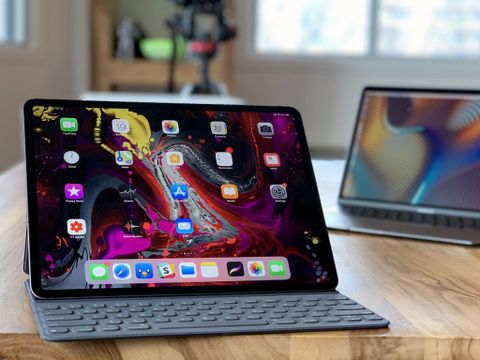I received a lot of great feedback on my iPad Pro review and I appreciate it very much. But I also got some criticism and I think it was fair. I didn't have as many negatives on my list as some other reviewers, but I think it's because I reviewed the new hardware and most of the negatives were directed at the not so new software. Also, I didn't address the iPad Pros ability to replace a laptop, which is something almost every other review focused on extensively.
For the software, I viewed that as a known quantity and, at 20-minutes long already, didn't want to spend even more time recapitulating what's pretty much the same story wrapped in a new, if much more powerful book. The counterargument was and is, and again I think fairly, that the new power should prompt not a recapitulation but a reexamining of the story.
As a laptop replacement, I don't really wonder about the iPad Pro that way, any more than I wonder about the MacBook Air replacing the iMac Pro. Both the iPad Pro and MacBook Air are ultra-portables, and both the MacBook Air and iMac Pro are traditional computers, but to me they remain different, if overlapping tools in the belt. The counterargument was and is, that whether or not Apple is positioning the iPad Pro as a laptop replacement, tech media certainly and some or many customers are looking at it in exactly that way.
So, after spending two weeks now with Apple's third generation iPad Pro, I decided to focus this re-review on what I missed last time: iPad Pro as laptop replacement and the iPad Pro software story. And what I think everyone is still getting wrong.
iPad Pro (2018) as a laptop replacement
I think Apple had two slides at the October event that caused a lot of confusing. The first showed iPad sales relative to laptop sales in the rest of the industry. In addition to annoying PC laptop fans no end, it also helped many reviewers justify the iPad Pro-as-laptop-replacement as their primary narrative. After all, Apple was comparing the two, right up there on stage.

My read was different. It wasn't. Oh, look at how many people are choosing iPad as their laptop! It was, oh, look at how many people are choosing iPad instead of a laptop. That difference might sound subtle but I think it's also key to understanding the market.
The second showed A12X performance as being "Faster than 92% of all portable PCs". There, I think Apple was just strutting over its platform technology teams continued crushing of mobile silicon. But, combined with early leaked Geekbench scores showing the new iPad rivaled a modern MacBook Pro in terms of performance, I think, cemented "laptop replacement" in a lot of minds.
If it's as powerful as a MacBook Pro, it should be a MacBook Pro, right?
I have to admit, I find myself thinking that way a lot. I come from a traditional computer background that's shaped a lot of my preconceptions about these types of devices should be and do, and I have a very hard time looking beyond my own wants and needs and understanding that I'm not the market any more. In fact, traditional computer types like me are an increasingly small part of the market.
Hence that graph. And hence the iPad.
When Steve Jobs introduced it, from the very moment he introduced it, he went out of his way to clearly say and show that the iPad wasn't meant to be a laptop, let alone a laptop replacement. Yes, even though Apple had a keyboard dock for it on day one, it was meant to be a third category that fit between a smartphone and the Mac.
Now, that was fine for the iPad nothing, but iPad Pro is for pros, right? It has the word right in the name. Surely that's meant to be a laptop replacement?
It's super tempting to think that way, but it also seems limited. Is the MacBook Pro an iMac Pro replacement? For more people than the MacBook Air, I bet, but certainly not everyone. Nor is it meant to be. It's meant to be an alternative for those willing to trade some power for portability, or an addition for people who need maximum power at the desk but also as much power as possible on the go.
Is the 12-inch MacBook an iPad Pro replacement? Probably, for people who want something ultra-light that can run macOS down to it's UNIX terminal. For those who want an incredibly powerful tablet for illustration, drafting, modeling, and more? Not so much.
But they're not pros, is something really easy to say. It's like upstate New York. Anyone who lives even a town to the north is upstate. Anyone who doesn't do exactly what I do or something that fits in a traditional box isn't a pro. So they run a website and produce some of the best automation work and content on the planet. They use an iPad Pro as their primary computer. Must not really be such a Pro…
Yet, if Apple has had one core mission since inception it's been to relentlessly, continuously, democratize technology. To make it more accessible to more people. Not just to cater to existing pros but to help make new kinds and generations of pros. Not to serve only the needs of power users but to empower every user.
I can't tell you how many people I know — how many professionals in all walks of life — who have always found traditional computers to be intimidating and unapproachable. How many legit geniuses have been made to feel dumb and less than because their brains just didn't fit a file system or their fingers, a mouse.
When you look at that graph again, sure, there are some traditional computing types buying some of those iPads instead of a laptop. But there are countless more buying those iPads because they're not laptops.
Even iPad Pro with all the power of A12X, and they're using it to draw storyboards for major studio productions, swipe through medical scans, receive, mark up, and resend documents and comps, crush photos, djay clubs, take clients through and tweak architectural models, and do a ton of real pro work, every damn day.
And they'll be able to keep doing it for years to come because A12X can not only handle augmented reality, machine learning, computational photography, and other heavy workloads today, it has enough headroom to handle iOS 13, 14, 15, and likely many more workloads to come.
If those workloads are different from a journalists or a developers or, yeah, me, so be it. They're still every bit as important. If a laptop is better for you, great, you have plenty of those to choose from. If an iPad Pro is better for you, well it's the first thing that really is so everyone else can just back up off. Because it's not just about us. It's about all of us.
In fact, I'd go so far as to say if Apple didn't consider it exactly that way, the company wouldn't have introduced the new iPad Pro at the exact same event where, just minutes before, it introduced the new MacBook Air. An iPad Pro and a laptop, not an iPad Pro instead of a laptop.
iPad Pro 2018 and the iOS story
All that said, whether or not you or I or anyone thinks the iPad Pro should be a laptop replacement or not, there are undeniably areas where the iPad Pro still isn't all the iPad Pro it could be. Where, even with all the power of the new hardware, it still hits a software sized brick wall.

One of the worst mistakes you can make in tech support is stating solutions you think you want rather than problems you actually have, because quite often there's a much smarter, better solution out there that just never occurred to you. Maybe because it hasn't even been conceived of or implemented yet. So, I'm going to stick to laying out my problems:
- You can't just plug in a drive and Dyson down files the way you can a camera or SD card for images and video.
- When using a keyboard, there's no way to navigate without taking your hands off said keyboard.
- When loading web pages, I get the phone version rather than the desktop version way, way to often. Especially Reddit. Dammit, Reddit.
- I can't podcast because I can't Skype or FaceTime or whatever with other people and still record my own audio at the system level at the same time. Let alone multiple tracks.
- I can't create and deploy App Store apps for iPad using the iPad. Well, ok, not me, but developers can't and they're currently the largest group of professionals in the market.
- I can't lend my iPad Pro to anyone else, be it a colleague or a kid, without them having access to all my stuff.
That's my list. I know other have their lists. But this one is mine.
And again, I could suggest just implement DocumentPicker for external storage the way ImagePicker is already implemented for SDCards, have an indirect navigation option using the keyboard the way Apple TV already has FocusUI using the Siri Remote, have a permanent "Load Desktop Site" setting like there's a permeant "Use Reader Mode" settings, have system-wide audio recording like there is video recording, release an Xcode for iPad app that, like the forthcoming Photoshop for iPad, lets developers perform an important subset of work synced to an online repository, and have an iCloud Accounts option that lets multiple users sign-in and sign-out to access their own environments, including GuestBoard and a kid's restricted mode.
I'd also add something about the Home screen, because if I don't, so many of you will point it out so immediately. There's some interesting stuff around the minus one Home screen — the page you get to by swiping the other way from the Home screen. But, ultimately, like I said back in 2015, I'd love to see iPad get the same thing Apple Watch and Apple TV got: It's own version of SpringBoard. iPadOS, like watchOS or tvOS.
Mostly because a dedicated iPadOS team would force major full point releases to ship every year, just like new versions of watchOS and tvOS, and not just every few years as iPhone gravity wells allowed.
There were rumors Apple was working on something like that, actually a lot of things I listed, for iOS 12. But, when the decision was made to go all-in on performance enhancements, it got postponed to iOS lucky-number 13 or later.
iPad Pro (2018) two weeks later
Ok, so this has ended up being far more rant than it has re-review. For the last two weeks I've been using the new iPad Pro for almost everything. Where I haven't been using the iPad Pro much if at all is video and image editing. Photoshop is just muscle memory for me at this point and I'm set in my ways, and I just can't do graphics work — not photo editing, that's fine, I mean graphics editing — as fast in Pixelmator on iPad as I can on the Mac. That might change when quote-unquote real Photoshop for iPad Pro ships next year. I'm cautiously neutral-mystic. We'll see.
Same for Final Cut Pro X. iMovie is quick. Luma Fusion is powerful. But neither lets me do what what I need, as fast as I need, like Final Cut. So, as much as some of you want some form of Xcode that lets you open your existing projects on the iPad Pro, I would very much like that for Final Cut Pro. I imagine that'll require a bunch of cloud-based abstractions, same as Photoshop, but just the ability to tap into, tweak, and send back work on the go would let me leave my Mac home far vmore often.
For other things, not just drawing, I find the iPad Pro far better and faster already. I'm basically doing all my writing on it. That's thanks to side-by-side apps, which I use all the time on iOS, because they're still a hot mess on macOS, and one that seems to have been abandoned as fast as it was introduced.
If all I did was blog, and edit if not record podcasts, I could easily go all-in on iPad Pro.
To steal a line from John Gruber, it's the lightness of iOS is what lets macOS be heavy, or maybe it's vice versa. Either way. Both. Whatever.
For those professionals who don't want or need a laptop, but do want or need more than a phone, iPad Pro can be just perfect. Amazing screen, amazing silicon, with a better-than-ever Apple Pencil and what feels more like a just-as-good-if-differently-compromised Keyboard Folio as options.
For those professionals who want a heavy Mac, like a 15-inch MacBook Pro or iMac Pro, iPad Pro might likewise be the perfect portable for when you want something light to take a subset of your work with you on the go. It's way easier to carry, especially than the iMac, but it still packs a ton of punch for everything else you want to do.
For those professionals for whom it's not reasonable to buy a second computer and iPad Pro just doesn't do enough to be the primary, that's totally valid too. And it's why Apple released a brand new MacBook Air at the same time, and even showed off a mobile Vega 15-inch MacBook Pro the same day.
If iOS 13 or iOS 14 change that, reassess then. Otherwise, you compute you.
Personally, I like the direction Apple is going with iPad Pro, I just don't like how long it's taking to get there. The hardware is bleeding edge. Always. The software, be it iOS 9 or iOS 11, comes in fits and starts.
But traditional computers, including macOS, have so much legacy baggage that was never was or never should have been meant for humans to deal with. A few years to get copy and paste, a decade to get drag-and-drop. It's glacial in a way that's totally not cool, but it's not porting — it's re-imagining, and that's what needs to be done. Just much, much, much — did I say much — faster.

Rene Ritchie is one of the most respected Apple analysts in the business, reaching a combined audience of over 40 million readers a month. His YouTube channel, Vector, has over 90 thousand subscribers and 14 million views and his podcasts, including Debug, have been downloaded over 20 million times. He also regularly co-hosts MacBreak Weekly for the TWiT network and co-hosted CES Live! and Talk Mobile. Based in Montreal, Rene is a former director of product marketing, web developer, and graphic designer. He's authored several books and appeared on numerous television and radio segments to discuss Apple and the technology industry. When not working, he likes to cook, grapple, and spend time with his friends and family.

